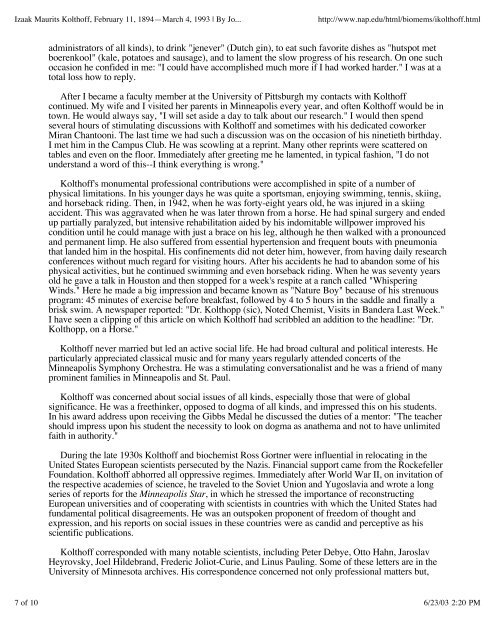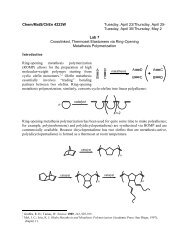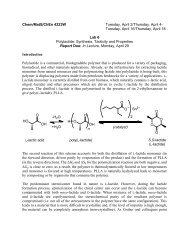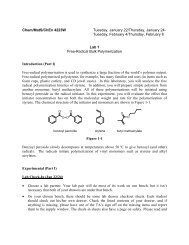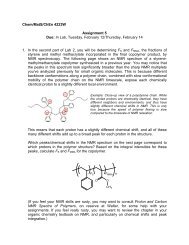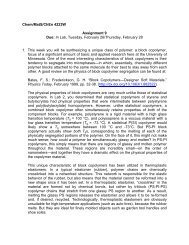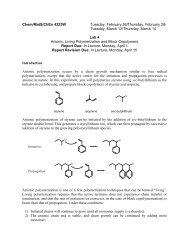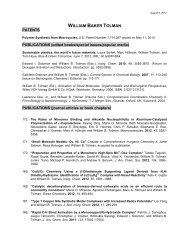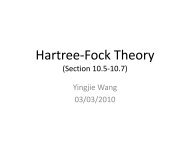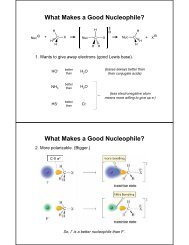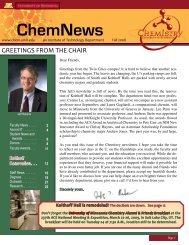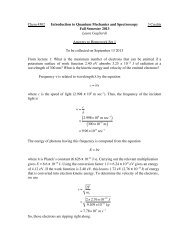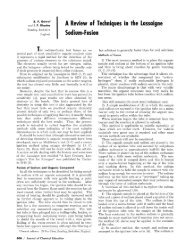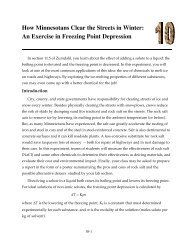<strong>Izaak</strong> <strong>Maurits</strong> <strong>Kolth<strong>of</strong>f</strong>, February 11, 1894—March 4, 1993 | By Jo...http://www.nap.edu/html/biomems/ikolth<strong>of</strong>f.htmlChemical Society (Nichols Award [1949], Fisher Award in Analytical Chemistry [1950], and theWillard Gibbs Medal [1964]), the Electrochemical Society Olin-Palladium Medal (1981), and thePittsburgh Analytical Chemistry Award (1981), as well as honorary doctor's degrees from the<strong>University</strong> <strong>of</strong> Chicago, Brandeis <strong>University</strong>, <strong>University</strong> <strong>of</strong> Arizona, <strong>University</strong> <strong>of</strong> Groningen(Netherlands), and the Hebrew <strong>University</strong> <strong>of</strong> Jerusalem. He was the recipient <strong>of</strong> numerous other honorsfrom chemical societies and universities abroad. In 1938 he was knighted to the Order <strong>of</strong> Oranje-Nassau<strong>of</strong> the Netherlands, and in 1947 he was elevated to a commander <strong>of</strong> the same order by the Dutch queen.He was elected to the National Academy <strong>of</strong> Sciences in 1958.One would expect that <strong>Kolth<strong>of</strong>f</strong>'s prodigious output could be accomplished only by running a large,efficient, and hard-driven operation. This indeed was the case in the latter two respects, but <strong>Kolth<strong>of</strong>f</strong>'sprogram was never particularly large. Nor were his interests <strong>of</strong> a routine nature that could lead to a largeoutput with little effort. Instead they were strongly focused on the elucidation <strong>of</strong> significant and complexproblems. The efficiency <strong>of</strong> his program derived from his talent for finding the most direct route towardsolution <strong>of</strong> a problem. While current analytical chemistry is strongly (arguably too strongly)instrumentation-oriented, <strong>Kolth<strong>of</strong>f</strong>'s work was chemistry-oriented. Much <strong>of</strong> his research was donebefore the great influx <strong>of</strong> increasingly sophisticated instrumentation after World War II. For him,instrumentation was a means to an end, not an end in itself. Nevertheless, he used the complementaryfeatures <strong>of</strong> different types <strong>of</strong> instrumentation available to him to great advantage, e.g., conductometry,potentiometry, voltammetry, and ultraviolet-visible spectrophotometry in addressing the dauntingproblems <strong>of</strong> nonaqueous solution chemistry.<strong>Kolth<strong>of</strong>f</strong>'s personal work habits were unusual. He would begin his workday by spending a couple <strong>of</strong>hours reading abstracts, papers, and research reports in the seclusion <strong>of</strong> his apartment in the FacultyClub <strong>of</strong> the university. At the same time he would write directives to his coworkers for future work onnotepaper printed at the top "From the desk <strong>of</strong> I. M. <strong>Kolth<strong>of</strong>f</strong>." All <strong>of</strong> us would find these notes on ourdesks later in the day. <strong>Kolth<strong>of</strong>f</strong> would not arrive in his <strong>of</strong>fice until 10:30 or 11:00. He would first dictateletters to his secretary, the highly competent Christa Elguther. He was a prolific correspondent andanswered letters punctually. During the afternoons he would have individual research conferences withhis graduate students and postdoctoral associates. The schedule in my own case was that I would turn inmy weekly progress report on Wednesdays. This always would be returned to me on Thursdays,annotated in the margins and sometimes across the text with numerous comments, suggestions, anddirectives. During Friday afternoons, I would meet with <strong>Kolth<strong>of</strong>f</strong> for half an hour to discuss the report.He evaluated everything in a highly critical way, but the majority <strong>of</strong> us understood the need for that.Some <strong>of</strong> his suggestions were monumental in scope, requiring good fortune and several months <strong>of</strong> hardwork, but they were presented with the clear expectation <strong>of</strong> a rapid solution. We all lamented suchunrealistic expectations. Towards the end <strong>of</strong> my four-year stay Stanley Bruckenstein (cozily finishedwith his research) gave me some sage advice: "When <strong>Kolth<strong>of</strong>f</strong> mentions a particularly daunting task,keep it in mind but do not necessarily work on it. If he mentions it a second time, begin working on it,and if he refers to it a third time you better have results to report." I only wish Stanley had divulged thisto me earlier in my career. Perhaps we worried too much about some <strong>of</strong> <strong>Kolth<strong>of</strong>f</strong>'s apparently unrealisticexpectations. One Friday afternoon he mapped out a new and wide-ranging investigation. As he wastalking, I was thinking, "I hope I will have something significant to report a month from now."<strong>Kolth<strong>of</strong>f</strong>, however, concluded by saying, "I travel to Iowa State tomorrow morning at 9 o'clock. Cometo the airport and report what you have found." After some soul searching I decided to ignore thisdirective. He never mentioned it again.<strong>Kolth<strong>of</strong>f</strong> could be harsh with his coworkers. I believe he did not fully realize just how intimidatinghe could be. Quite <strong>of</strong>ten after research conferences some <strong>of</strong> his graduate students and postdoctoralassociates appeared to be in a state <strong>of</strong> shock. <strong>Kolth<strong>of</strong>f</strong>, in turn, would grumble afterwards about "a tale<strong>of</strong> woe" and "babe in the woods." Nevertheless, the great majority <strong>of</strong> his coworkers became his devotedfriends after they left. <strong>Kolth<strong>of</strong>f</strong>, in turn, expended great effort in promoting their careers, at least forthose people who had satisfied him that they were serious pr<strong>of</strong>essionals. I was fortunate in getting toknow him well over a period <strong>of</strong> 40 years. He was a longtime friend <strong>of</strong> my parents-in-law, the Luytens,who were also natives <strong>of</strong> Holland. He would <strong>of</strong>ten visit to talk (in Dutch, mostly about politics and6 <strong>of</strong> 10 6/23/03 2:20 PM
<strong>Izaak</strong> <strong>Maurits</strong> <strong>Kolth<strong>of</strong>f</strong>, February 11, 1894—March 4, 1993 | By Jo...http://www.nap.edu/html/biomems/ikolth<strong>of</strong>f.htmladministrators <strong>of</strong> all kinds), to drink "jenever" (Dutch gin), to eat such favorite dishes as "hutspot metboerenkool" (kale, potatoes and sausage), and to lament the slow progress <strong>of</strong> his research. On one suchoccasion he confided in me: "I could have accomplished much more if I had worked harder." I was at atotal loss how to reply.After I became a faculty member at the <strong>University</strong> <strong>of</strong> Pittsburgh my contacts with <strong>Kolth<strong>of</strong>f</strong>continued. My wife and I visited her parents in Minneapolis every year, and <strong>of</strong>ten <strong>Kolth<strong>of</strong>f</strong> would be intown. He would always say, "I will set aside a day to talk about our research." I would then spendseveral hours <strong>of</strong> stimulating discussions with <strong>Kolth<strong>of</strong>f</strong> and sometimes with his dedicated coworkerMiran Chantooni. The last time we had such a discussion was on the occasion <strong>of</strong> his ninetieth birthday.I met him in the Campus Club. He was scowling at a reprint. Many other reprints were scattered ontables and even on the floor. Immediately after greeting me he lamented, in typical fashion, "I do notunderstand a word <strong>of</strong> this--I think everything is wrong."<strong>Kolth<strong>of</strong>f</strong>'s monumental pr<strong>of</strong>essional contributions were accomplished in spite <strong>of</strong> a number <strong>of</strong>physical limitations. In his younger days he was quite a sportsman, enjoying swimming, tennis, skiing,and horseback riding. Then, in 1942, when he was forty-eight years old, he was injured in a skiingaccident. This was aggravated when he was later thrown from a horse. He had spinal surgery and endedup partially paralyzed, but intensive rehabilitation aided by his indomitable willpower improved hiscondition until he could manage with just a brace on his leg, although he then walked with a pronouncedand permanent limp. He also suffered from essential hypertension and frequent bouts with pneumoniathat landed him in the hospital. His confinements did not deter him, however, from having daily researchconferences without much regard for visiting hours. After his accidents he had to abandon some <strong>of</strong> hisphysical activities, but he continued swimming and even horseback riding. When he was seventy yearsold he gave a talk in Houston and then stopped for a week's respite at a ranch called "WhisperingWinds." Here he made a big impression and became known as "Nature Boy" because <strong>of</strong> his strenuousprogram: 45 minutes <strong>of</strong> exercise before breakfast, followed by 4 to 5 hours in the saddle and finally abrisk swim. A newspaper reported: "Dr. Kolthopp (sic), Noted Chemist, Visits in Bandera Last Week."I have seen a clipping <strong>of</strong> this article on which <strong>Kolth<strong>of</strong>f</strong> had scribbled an addition to the headline: "Dr.Kolthopp, on a Horse."<strong>Kolth<strong>of</strong>f</strong> never married but led an active social life. He had broad cultural and political interests. Heparticularly appreciated classical music and for many years regularly attended concerts <strong>of</strong> theMinneapolis Symphony Orchestra. He was a stimulating conversationalist and he was a friend <strong>of</strong> manyprominent families in Minneapolis and St. Paul.<strong>Kolth<strong>of</strong>f</strong> was concerned about social issues <strong>of</strong> all kinds, especially those that were <strong>of</strong> globalsignificance. He was a freethinker, opposed to dogma <strong>of</strong> all kinds, and impressed this on his students.In his award address upon receiving the Gibbs Medal he discussed the duties <strong>of</strong> a mentor: "The teachershould impress upon his student the necessity to look on dogma as anathema and not to have unlimitedfaith in authority."During the late 1930s <strong>Kolth<strong>of</strong>f</strong> and biochemist Ross Gortner were influential in relocating in theUnited States European scientists persecuted by the Nazis. Financial support came from the RockefellerFoundation. <strong>Kolth<strong>of</strong>f</strong> abhorred all oppressive regimes. Immediately after World War II, on invitation <strong>of</strong>the respective academies <strong>of</strong> science, he traveled to the Soviet Union and Yugoslavia and wrote a longseries <strong>of</strong> reports for the Minneapolis Star, in which he stressed the importance <strong>of</strong> reconstructingEuropean universities and <strong>of</strong> cooperating with scientists in countries with which the United States hadfundamental political disagreements. He was an outspoken proponent <strong>of</strong> freedom <strong>of</strong> thought andexpression, and his reports on social issues in these countries were as candid and perceptive as hisscientific publications.<strong>Kolth<strong>of</strong>f</strong> corresponded with many notable scientists, including Peter Debye, Otto Hahn, JaroslavHeyrovsky, Joel Hildebrand, Frederic Joliot-Curie, and Linus Pauling. Some <strong>of</strong> these letters are in the<strong>University</strong> <strong>of</strong> <strong>Minnesota</strong> archives. His correspondence concerned not only pr<strong>of</strong>essional matters but,7 <strong>of</strong> 10 6/23/03 2:20 PM


